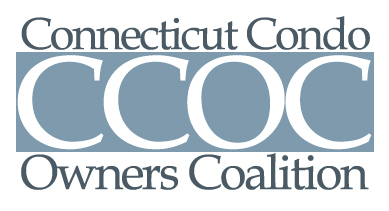FAQ FOR BUYERS

Condo life, to some, equals carefree living. It could be like paradise with all the outside chores done for you and you just enjoy the amenities.
CCOC has received numerous complaints from Connecticut condo owners who say the only reason they are still living in their condos is because they can’t sell them for the amount needed to pay off the mortgage.
The most serious complaints, most frequently, come from residents of small complexes – under 50 units who are self-managed.
- A board of directors favoring their friends and relatives.
- Last minute, unexpected increases in condo fees and special assessments for roofs, siding, other major projects
- High maintenance and repair cost for the “chosen” few.
Because of all the complexities, prospective buyers need to fully investigate the condo complex you are considering purchasing; the smaller the complex the more investigation that should be done.
You first need to read all the documents that govern the condo association. The rules and regulation – whether presently enforced or not – can be enforced at any time. If the rules say every unit must have a red door that is exactly what you should expect. If the rules say no dogs or no children, it means no dogs and no children.
Violating the rules or failing to pay your condo fee on time can result in fines which if not paid promptly can result in the board of directors taking you to court, where they will almost always win. You end up paying not only the penalties; you will also have to pay for the association’s court costs and for its legal fees.
WHAT BASIC QUESTIONS TO ASK AND WHAT YOU NEED TO KNOW BEFORE BUYING A CONDO
FINANCIAL
- Ask what types of financial reports are provided to the Board and unit owners each month.
- Is there a Profit and Loss Statement
- Is there a report that details each check, the payee, amount, and purpose?
- Is there a list of delinquent owners
- Is the delinquent list, redacted, provided to unit owners
- When are my monthly common fee charges due? Is there a late fee and how much?
- Does the Association have reserve funding – How much money is invested?
- How many owners are behind in their monthly fees? For how long?
- Has the association been involved in any civil or criminal law suits?
- Ask questions about the master insurance policy; what does this policy cover, and what are you responsible for?
- Is there a professional property manager?
- How many on the board of directors? How long has the president served?
- Does the Association have an Attorney representing the Association to assist in foreclosure issues and other legal matters?
- Does the Association, at the end of their fiscal or calendar year have an auditor to check their financial status?
STRUCTURE & GROUNDS
- What is the association’s responsibility – what is my responsibility?
- Are doors and windows “limited common property? This may mean you pay to replace, but there could be specifications for these replacements as well as specific requirements on the type of contractor.
- Can I plant on the common ground – What is the common ground?
- Are bird feeders allowed?
- Can I put hanging plants on the front soffit?
- Can I have a fire pit on my patio?
- Are generators allowed and if so, ask about the regulations regarding installing a transfer switch.
- What are the structural rules before installing a satellite dish?
CAPITAL IMPROVEMENTS
If it is disclosed that common fees have not increased at all or have not increased in a substantial length of time, although it may sound wonderful, be attentive. Look at the unit structures, look at the grounds; are they well kept or do they look like they need upgrading or repairs.
- What major capital renovations have been completed?
- What major capital renovations are being proposed for future consideration?
ASK – do the roofs need to be replaced? Is there a paving or asphalt project being considered, for units with concrete patios or attached decks – have these been maintained/repaired on a regular basis; if there is a swimming pool, tennis court, club house, again, are these maintained/repaired on a regular basis or are they in need of major repairs?.
For the small condo complex that has been built some time ago; this could translate to potential increases in common fees or an additional assessment.
For the new small condo complex; although major repairs/replacement for roofs, decks, patios, etc may not be needed for some time, determine if there are projects that are still not done.
A new swimming pool or tennis court for next summer may increase your common fees.
NEXT ISSUE: What is in the Reserve Fund, what is the monthly transfer to the reserve fund, and will the current reserve fund cover proposed improvements?
Listen to the voice inside you – the barometer: is there a sizeable reserve fund that will cover these major repairs. No or low reserve funding could mean a possible increase in your monthly fee or an additional assessment.
Some of these questions are addressed in the “Resale Packet” that is provided by law to your agent for you by the Association and/or Management Company.
Ride or walk through the complex, talk to individuals you may see, do research if you can, be observant. Is there a no pet rule? You do not want to move in and find out that your loyal family pet can no longer be a part of your family – ask questions.
You will be provided with the governing covenants for the condo complex. This will be the Declaration, and probably By-Laws and Rules & Regulations. When you first look at the declaration, don’t be traumatized. It must be provided by law and although you may not want to read through what may seem to be numerous pages of legalese, keep it in a safe place for future reference.
Read and become familiar with the “Rules”. These should outline the basic set of guidelines for what you can and cannot do. If you don’t know or are uncertain about what you can or cannot do – call, email, or write the management company or the person who is the head of the condo association and ask your question.
Condo complexes should be democracies with representative government. But the reality is that in virtually all complexes, the decisions are made by the Board of Directors elected or reelected by unit owners. New legislative law mandates more rights for unit owners. It is up to the unit owner to exercise those rights.
Apathy is the greatest downfall of the unit owner. Attend monthly board meetings; request a copy of the financial report if you cannot attend a meeting. ,
In most cases, directors of association boards are unit owners too. Most volunteer their time; their decisions on financial matters and the managing of the condo complex affects them as well as you. However, whether you are a first time owner or if this will be your retirement home, it is a major investment. You cannot make a decision without weighing all the facts and when you do decide to buy, get involved and be attentive.




